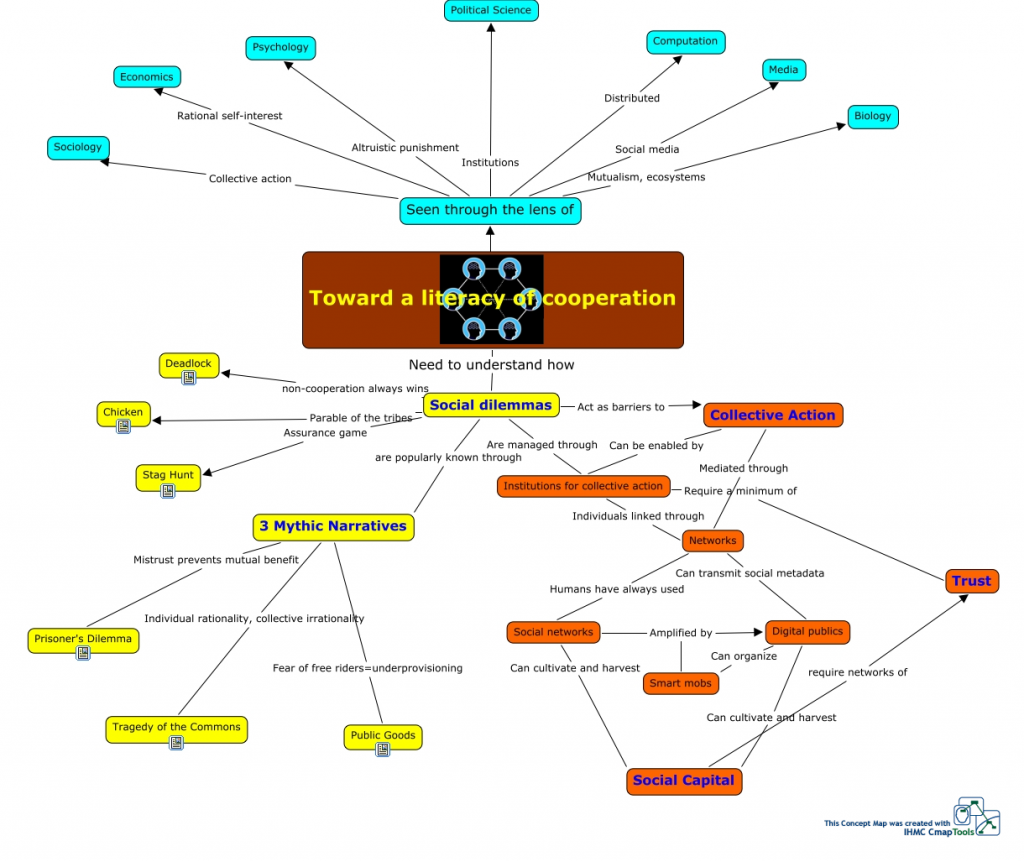I see a new story emerging about how humans get things done together. The outlines of this new narrative can be seen in recent evidence that contradicts old assumptions about human selfishness versus altruism, self-interest versus collective action. What could be more important than understanding how people cooperate and fail to cooperate? Problems and challenges in everyday life in the home, office, factory, public places and global behavior such as conflict, pollution, resource sustainability are all being addressed with very little comprehensive knowledge about cooperation. Before empirical biology, people thought disease was caused by foreigners, witches, or sin. With the advent of experimental science and the invention of the microscope, we understood that microorganisms in water and food were killing our children. In regard to cooperation theory, fragmentary and specialized knowledge is advancing in a dozen or more different fields, but in terms of putting this fragmented knowledge together into a systemic whole, we’re still in the pre-microscope era.
Cooperation Theory and Practice
Toward a Literacy of Cooperation Syllabus
I teach this course once or twice a year online via Rheingold U.
Cooperation Commons (Unfortunately this site no longer exists)
Together with Andrea Saveri and Kathi Vian of the Institute for the Future, I compiled resources toward the goal of catalyzing and interdisciplinary study of cooperation. Vian, Saveri, and IFTF production director Jean Hagen took the voluminous and disorganized notes I had been making for a couple years and turned them into a visually stunning map of cooperation theory, another visually stunning chart of “technologies of cooperation,” and a print report. When we talked to specialists from different disciplines, it became clear that scientists working with complex interdependencies in ecosystems were not familiar with the work of ethnographers and complexity scientists studying Balinese water sharing rituals, and neither group of specialists were likely to be familiar with cooperation-focused research in economics or computer science. We compiled more than seventy summaries of essential work across a broad variety of disciplines. Each summary contains a link to the source document with complete bibliographic information, a one-sentence, one-paragraph, and one-page summaries of the work.
Technologies of Cooperation report (January, 2005)
“Emerging digital technologies present new opportunities for developing complex cooperative strategies that change the way people work together to solve problems and generate wealth. Central to this class of cooperation-amplifying technologies are eight key clusters, each with distinctive contributions to cooperative strategy. Each of these technology clusters can be viewed not only as a template for design of cooperative systems, but also as tools people can use to tune organizations, projects, processes, and markets for increased cooperation. Specifically, each can be used in distinctive ways to alter the key dimensions of cooperative systems—structure, rules, resources, thresholds, feedback, memory, and identity.”
Designing Business for an Open World by Institute for the Future and Herman Miller Company
“How do you do business with an illusive network that belongs to nobody? How do you work with talented people you are likely never to meet and who are not motivated by money? How can businesses learn to “take advantage of” innovation when it comes along in an open-platform world?And on another level, are we seeing the beginning of the end for the existing business models based on hierarchy, planning and management, and pure competition? We are in fact seeing a new level of change. What are the indicators? The rise of open-source development communities. The growth of an on-line knowledge commons. A shift of power to socially and technologically connected “smart mobs.” And many more.”
Technologies of Cooperation map (September, 2005)
New Strategic Pathways in Business: Leveraging Technologies of Cooperation (June, 2005)
Howard Rheingold Screencast: Introduction to Cooperation Studies (2009)
“Emerging digital technologies present a range of catalysts for enabling new social arrangements that will transform our business and social institutions. In particular, new technologies of cooperation will enable social arrangements that help us develop new complex cooperative strategies. Such transformation has happened in the past, with the development of the printing press that led to broader literacy and public discourse, which ultimately shaped the development of democratic society. We’re on the threshold of a new series of changes that will transform the way people work together to solve problems and generate wealth.”
Videos from 2005 Stanford University course “Toward a Literacy of Cooperation.”
Peter Kollock, Jimmy Wales, Bernardo Huberman and others
The Cooperation Revolution SGI Quarterly (April, 2008)
“When I started investigating the nature of cooperation, I kept running into a familiar story about human behavior. Humans are particularly adept at telling themselves what kind of creatures they are, and these narratives have proved tenacious and potent. When the stories people fervently believe about the nature of human nature change, lives and civilizations change.”
